President Trump To End McCain’s F-35 Flying Bath Tub: An NWO Tax Funded Scheme To Drain U.S. Military
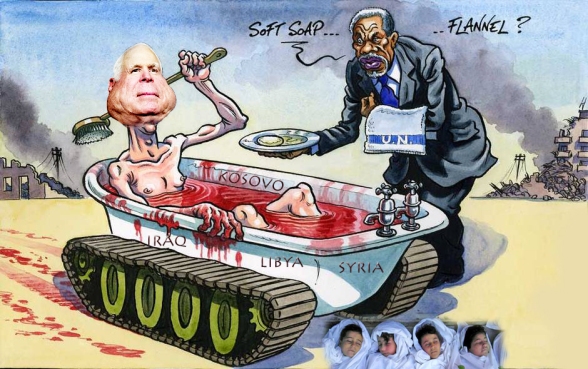
President-elect Donald Trump dropped a bombshell on the defense industry: He asked Boeing to price out an alternative to Lockheed Martin’s F-35 fighter jets, a hugely valuable contract that Trump has criticized as too expensive. Lockheed’s share price plunged almost 2 percent in after-hours trading.
It was the culmination of weeks of interference by the president-elect in the arcane, bureaucratic function of federal procurement. In early December, it was Boeing on the receiving end of Trump’s wrath, when he tweeted that the costs of the new Air Force One planes are “out of control” and told reporters, “Boeing is doing a little bit of a number.”
A few days later, he criticized the cost of the F-35 contract. And earlier this week, he convened top military officials and the CEOs of Boeing and Lockheed at his Mar-a-Lago estate to discuss how to bring costs down. Trump told reporters afterward, “We’re just beginning, it’s a dance.”
More than any other president, Trump appears to want to take a direct role in federal contracting, a technical, complex part of the government that is run by tens of thousands of career civil servants. It is normally a stodgy, rule-bound job, governed by the Federal Acquisition Regulation book, which has more than 50 parts and is nearly 2,000 pages long. Mastering the rules and norms takes years, if not decades, and rarely receives much, if any, attention from the upper echelons of government.
At first glance, Trump would appear to face significant obstacles in using federal contracts as a form of leverage. But conversations with nearly a dozen contracting experts, many who previously worked on procurement issues for the government, suggest that Trump could easily blow through them — and despite the complex bureaucracy, there would likely be few brakes on his use of the process to score political points, reward his friends and punish his enemies. If he does, it could have another effect as well: driving up prices for federal government purchasing overall.
Unlike traditional contracts, most federal contracts include a “get-out-of-jail” free clause that allows the government to break a contract for a wide variety of reasons. That power is not unlimited, but for companies to prove the government illegally violated the contract, they must prove that the contracting officer acted in “bad faith,” a standard that is exceptionally hard to meet. In one case, a judge held that the company needed “well-nigh irrefragable” — meaning indisputable — “proof” to meet that standard.
“That language really sent a message to how high the standard was,” said Sandy Hoe, a lawyer at Covington & Burling who has spent more than 40 years practicing government contracts law. “[The courts] have gone away from that but it is still a very, very high standard.”
It’s hard to know how far Trump could push this power; experts have never considered that a president could effectively use the clause as a weapon against individual companies to further his own political and policy agendas. But Trump has shattered norm after norm and rule after rule on his way to the presidency.
“Theoretically, it could be done,” David Drabkin, a former top procurement executive at the General Services Administration, said about Trump going after a specific company’s federal contracts. “But I can’t imagine it would ever come to that, because it would be a complete violation of both our rules and the culture of how we buy things. He could certainly threaten it. He’s already done it and it worked a little.”
That the president would use the federal procurement process broadly to advance a certain agenda is actually not uncommon. President Barack Obama has issued numerous executive orders requiring contractors to adhere to certain policies, such as not discriminating against LGBT employees, raising their minimum wage to at least $10.10 per hour and offering paid sick leave. Previous presidents have used those powers as well. And these can have a significant effect on the economy, as the government spent $440 billion on procurement contracts in fiscal 2015. But these were blanket policies, applying to all contractors across the federal government.
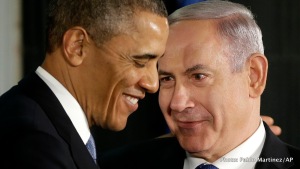
Barry
& Bibi have played polarity games upon the US as if they are at
odds with one another. The opposite could not be more true!
What Trump is doing, by targeting specific companies or specific federal contracts, is new and unprecedented, experts said. “Never seen anything like this,” said Sean O’Keefe, a former secretary of the Navy and comptroller of the Defense Department.
The most famous example of the federal government canceling a contract came in 1991, when then-Defense Secretary Dick Cheney terminated a $4.8 billion contact with General Dynamics and McDonnell Douglas to design and build the Navy’s A-12 stealth attack plane. At the time, the aircraft was 18 months behind schedule, around $1 billion over budget and 8,000 pounds overweight. It was the largest weapons-program termination in history and set off a 23-year legal battle between the companies and the federal government.
The lengthy legal battle occurred because the Navy terminated the contract “for default,” a legal standard meaning that the contractor failed to fulfill its contractual duties. Terminating a contract for default is rare and carries significant financial repercussions for the contractor, which does not get compensated for any uncompleted work.
“That means you failed to perform, show’s over and we’re going to stop sending you money,” said O’Keefe, who was involved in the A-12 case. “We don’t owe you another dime. Contract closed.”
While the stakes are high for both the government and contractor in termination for default cases, the government can also terminate contracts “for convenience.” Under such scenarios, the government ends a contract because it deems it no longer in the best interest of the country. It’s a unique power, rarely found in the private sector, that effectively allows the government to get out of contracts. The rationale is that the government’s needs change all the time, sometimes abruptly, such as when a war ends, so it needs the flexibility to adjust or cancel contracts.
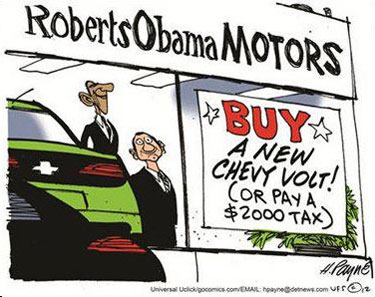
ONE OF THE DUMBEST OPINIONS BY SCOTUS TO DATE
Unlike termination for default, termination for convenience allows the contractor to recoup the costs of all its work done up to the point of termination. The government may also pay settlement fees and even sometimes pays the contractor a profit. Still, the termination can be complicated and the contractor loses future revenue. If the contractor believes the contracting officer was acting in bad faith when they cancelled the contract for convenience, they can file a lawsuit against the government. But those cases are rare and extremely difficult to prove.
For Trump to use the contracting process to punish a company, experts said he likely would terminate a contract for convenience. This, too, would involve a disruption in the bureaucracy: While the president is the ultimate contracting officer in the federal government, an implied authority given to him in the Constitution, he delegates that authority throughout the government, down to low-level contracting officers.
Technically, contracting officers are independent of their superiors, including the president; courts have held that officers must make an independent determination that terminating a contract is in the best interest of the country, said Steve Schooner, co-director of The George Washington University’s Government Procurement Law Program and a former top procurement official at the Office of Management and Budget. So Trump cannot simply force an officer to terminate a contract.
But political appointees are traditionally loyal to the president and civil servants would risk their career if they were to not fall in line. That means, in practice, contracting officers are likely to acquiesce. “They can choose to say, ‘I refuse to do that,’” said O’Keefe, “and then obviously they find themselves counting barrels of fuel in Beirut or something after it’s over.”
How far does Trump’s authority stretch before his actions would constitute acting in bad faith, meaning a contractor could sue the government and collect damages? To find out, I posed a hypothetical scenario to a number of contracting experts: A company angers Trump by moving 1,000 jobs overseas and, in response, Trump tweets that the government will terminate a company’s contract. A few days or weeks later, a contracting officer exercises the “convenience” clause and terminates a valuable contract with the company.

Rothschild Czar With CIA al-Qaeda aka al-Nusra scheme team to get Syria’s Banking System.
Is that bad faith? Experts said it would depend on specific facts in the case and the contract itself. But none said that that would certainly constitute bad faith. In fact, many said the government would likely still be favored to win the case.
“I couldn’t predict a clear-cut outcome at this point,” said Hoe, who said he would expect the administration to “cloak it in language that sounded like it was advancing the country’s interests and economic policies, so it wouldn’t appear to be a vindictive shot at a particular company.” He explained that a court could even hold that Trump acted in good faith because his actions were premised on saving U.S. jobs — so even if the termination of the contract had nothing to do with the contract itself, it might be legal. “It would be a fascinating case,” he added.“Let’s say he said publicly, ‘Boeing is criticizing my trade policy, so I am going to bring their prices down.’ That’s the most extreme version,” said Steven Kelman, who headed the Office of Management and Budget’s Office of Federal Procurement Policy in the 1990s and now is a professor of public management at Harvard’s Kennedy School. “My quick reaction is that that’s not illegal.”
More broadly, experts suggested that it would be unlikely that Boeing or other companies would sue the federal government for acting in bad faith, even if they had a good chance of winning the case. Such a move might jeopardize their other federal contracts, especially if the courts ruled against them.
Obama gave G.E. the chance to sabotage the engine for the F-35 And thats exactly what they did.
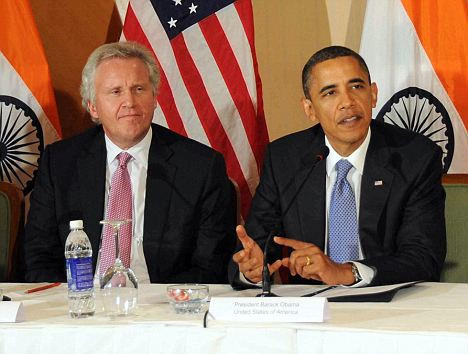
U.S. pResident Barack Obama seated with, General Electric’s Jeffrey Immelt, Boeing’s Christopher Chadwick,
“If I’m counseling Boeing, Air Force One is important to me, but am I going to fall on my sword? Come on,” said a lawyer who has done extensive work with government contracts and does not count Boeing as a client. “Boeing’s not going to challenge them on that. If you shoot at the king, you better kill him.”
England: Regicide ~ The Murder Of A King

King Charles II Son Of King Charles 1st.
The Corrupt Puritan Parliament Was Dealt A Swift Blow For Treason & Regicide By King Charles II.Asked whether there are any concerns at Boeing about Trump using the contracting process to gain leverage over companies and what legal safeguards existed to protect contractors, a Boeing spokesperson said, “They set the requirements for our various programs and we work with them to execute on that,” but declined to discuss how much authority Trump has over the federal contracting process.
When Charles II returned to become king of England in 1660, those men who had signed his father’s death warrant (and were still alive) were tried as regicides (the murderer of a king) and executed.
Anyone associated with the execution of Charles was put on trial. The only people to escape were the executioners as no-one knew who they were as they wore masks during the execution.
It’s tough to predict how Trump will use these powers once in office, and his transition team did not respond to a request for comment. He’s spoken frequently about punishing companies that move jobs overseas, including threatening them with tariffs, although experts are unsure if he has the legal authority to do so. If he wants to both punish companies that outsource while adhering to traditional norms and rules around contracting, Trump could issue an executive order that prohibits federal contractors from moving jobs overseas. It likely would only apply to future contracts, and might be hard to enforce.
If Trump involves himself in the federal contracting process purely to reduce costs, as seems the case with his attacks on the defense contractors, experts said he’ll have more leeway to cancel the contracts without violating the law, although his exact legal powers will differ depending on the specific contract. “Participating in negotiations with Boeing or Lockheed Martin, I would call it highly unorthodox but there’s definitely nothing illegal,” said Kelman. The F-35 program does contain clauses to terminate for default or convenience, said Drabkin, so the president could terminate it. However, that program is years in the making and the Chinese and Russians are developing their own variants of the F-35 jet. Any major delays or changes to the program will therefore draw significant interest, and possibly pushback, from Congress as well.
Still, just the possibility that Trump could use the contracting process in such a manner could have significant implications across the government and economy, creating new uncertainty for both companies and contracting officers. Whether Trump actually follows through on threats to interfere with the contracting process, those threats, often delivered through a tweet, can have an immediate impact on a company’s share price.
The Rothschild Cabal Wants To Control The U.S. Wealth With Stooges Like Obama, Jarret, & Immelt

Obama, Jarrett, & G.E.’s Immelt also owner of MSM.
Even when Trump doesn’t make an explicit threat, just his willingness to involve himself in individual contracts can influence a company’s decision-making. In Trump’s deal with Carrier Corp. to save about 700 jobs, Carrier executives said that the potential loss of federal business for Carrier’s parent company, United Technologies, influenced their decision-making. (United Technologies currently has about $7 billion in federal contracts.)
- Head Of Obama’s Economic Advisory Board: Jeffrey Immelt Of G.E., Stabs The United States In The Back!
- Obama’s Economic Advisors: G.E. Jeffery Immelt Included – Release Flawed Macro-Economic Models – Producing Deceptive Reports!
- General Electric Makes New Lear Jet In Mexico Where Unemployment is 4.9%: U.S. Taxpayers Bailed Out G.E. For $182.5 Billion. Thanx G.E.
The ultimate result of Trump threatening to terminate federal contracts, whether to prevent companies from moving overseas or to cut down on perceived waste, could be higher costs for the government. Companies, faced with the increased risk of termination or negative publicity from an angry tweet from the president, would likely raise their prices in response, experts said. “With long-term complicated programs, the things that drive up prices are instability and uncertainty,” Schooner said. “That’s what he just added to the process.”
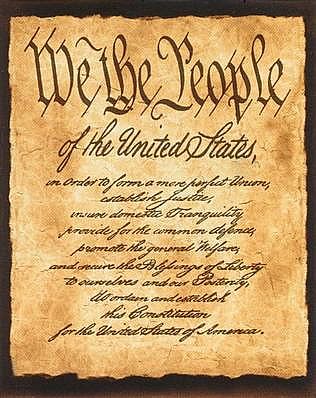
The president’s involvement in federal procurement is also likely to also slow the process. Contracting officers will negotiate and implement deals even more carefully, Schooner said, worried that the president could send out an early-morning tweet criticizing their work. All of that drives up costs for the federal government and delays much-needed acquisitions.
“He will scare the bejesus out of some fifth-level auditor who is going to say ‘Goodness gracious, maybe I ought to look at whoever he is attacking at the moment,’” said retired Adm. Dave Oliver, who was a top acquisition official in the Defense Department in the 1990s. “Am I going to believe the Lockheed Martin comptroller who is telling me this is OK, or am I going to believe the president?
“Whether the president has any legal standing of any kind in this doesn’t matter. That’s what the bully pulpit is all about,” he said. “He is going to be heard and he is going to have an impact.”
Politico

dow jones etch a sketch
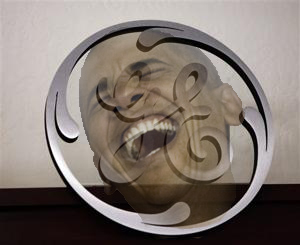
No comments:
Post a Comment